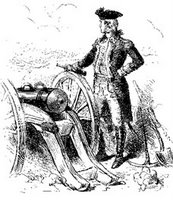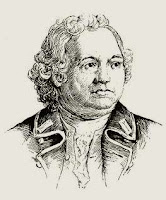Still on the broad topic of
Henry Knox,
Derek W. Beck has shared news of his article “No Ox for Knox?” in the July/August issue of
American Revolution magazine. He writes:
My “No Ox for Knox?” article questions the famous story of Col. Henry Knox leading a team of ox-drawn sleds laden with artillery through the snowy mountains of western Massachusetts. This story is a staple of both history books and the American subconscious, and has been immortalized in at least two artworks. . . . But could it be wrong? Read the article to see my argument that Knox had no oxen after all.
I haven’t seen the magazine yet, but I assume that Derek focuses on the particular leg of Knox’s trek from Lake Champlain to Cambridge in the winter of 1775-76.
The colonel definitely used oxen to move the heavy guns south from
Fort Ticonderoga, as shown by a receipt that the
New England Historic and Genealogical Register published in 1876:
Recd. of Henry Knox twenty six dollars which Capt. John Johnson paid to different Carters for the use of their Cattle, in dragging Cannon from The Fort of Ticonderoga to the North Landing of Lake George
The heavy guns were then floated down the lake. Knox planned to use more oxen for the overland journey, as he wrote in his journal in mid-December (published at the same time):
I sent an Express to Squire [George] Palmer of Stillwater to prepare a number of Sleds & oxen to drag the Cannon presuming that we should get there, & on Wednesday the 13th he came up & agreed to provide the necessary number of sleds & oxen & they to be ready by the first snow.
17 December Knox wrote to Gen.
George Washington about having “provided 80 yoke of oxen to drag them as far as Springfield where I shall get fresh cattle to carry them to camp.”
But then on 28 December, Knox recorded that Palmer and Gen.
Philip Schuyler were still at odds on the price for those ox teams. Instead, the next day Schuyler “Sent out his Waggon Master & other people to all parts of the Country to immediately send up their slays with horses suitable.” Thereafter Knox’s journal mentions horses. John P. Becker’s memoir,
The Sexagenary, briefly describes the ensuing trek from the perspective of an eleven-year-old driver, son of the man who supplied most of those horses.
But then Knox’s train came to Blandford, Massachusetts, on the eastern edge of the Berkshire Mountains. On 11 Jan 1776 he wrote:
At Blanford we overtook the first division who had tarried here untill we came up, and refus’d going any further, on accot. that there was no snow beyond five or six miles further in which space there was the tremendous Glasgow or Westfield mountain to go down. But after about three hours persuasion, I hiring two teams of oxen, they agreed to go.
Those teams are probably connected to the second receipt published with the journal:
Blanford Jany 13. 1776 Recd of Henry Knox eighteen shillings lawful money for Carrying a Cannon weighing 24C. 3 from this Town to Westfield being 11 Miles
That was signed by Solomon Brown (1737-1786). Above is his gravestone,
courtesy of Find-a-Grave.
So Knox, contrary to his initial plans, didn’t need any oxen to get the cannon
up the Massachusetts mountains, but he hired four to get them
down. By then, the colonel was convinced of the value of horses. The
Gilder-Lehrman Institute displays a 13 January letter in which Knox tells a colleague what to offer teamsters: “offer them 14/ York currency today for each Span of horses that is after they leave Springfield—After they get down the next Hill they will be able to travel much farther than Oxen.”
TOMORROW: Knox’s weather reports.
 On 4 and 11 August, the city of Cambridge will once again celebrate Cambridge Discovery Days with free walking tours, house tours, and other events at historic sites. This year’s theme is “Power and Politics,” inspired by the centennial of Cambridge’s own Tip O’Neill.
On 4 and 11 August, the city of Cambridge will once again celebrate Cambridge Discovery Days with free walking tours, house tours, and other events at historic sites. This year’s theme is “Power and Politics,” inspired by the centennial of Cambridge’s own Tip O’Neill.





